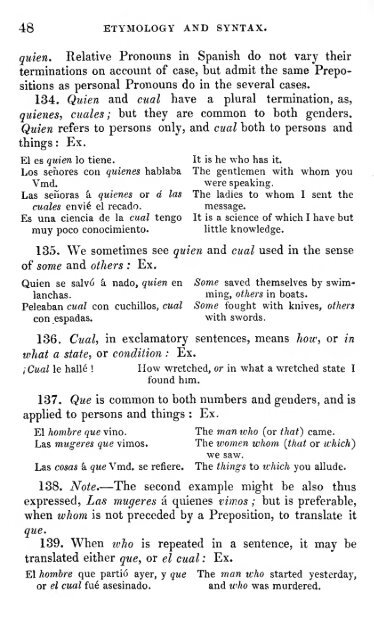A concise and simplified grammar of the Spanish language
A concise and simplified grammar of the Spanish language
A concise and simplified grammar of the Spanish language
You also want an ePaper? Increase the reach of your titles
YUMPU automatically turns print PDFs into web optimized ePapers that Google loves.
48 ETYMOLOGY AND SYNTAX.<br />
quien. Relative Pronouns in <strong>Spanish</strong> do not vary <strong>the</strong>ir<br />
terminations on account <strong>of</strong> case, but admit <strong>the</strong> same Prepo-<br />
sitions as personal Pronouns do in <strong>the</strong> several cases.<br />
134. Quien <strong>and</strong> cual have a plural termination, as,<br />
quienes, cuales ; but <strong>the</strong>y are common to both genders.<br />
Quien refers to persons only, <strong>and</strong> cual both to persons <strong>and</strong><br />
things: Ex.<br />
El es quien lo tiene. It is he who has it.<br />
Los señores con quienes hablaba The gentlemen with whom you<br />
Vmd. were speaking.<br />
Las señoras k quienes or d las The ladies to whom I sent <strong>the</strong><br />
males envié el recado. message.<br />
Es una ciencia de la cual tengo It is a science <strong>of</strong> which I have but<br />
muy poco conocimiento. little knowledge.<br />
135. We sometimes see quien <strong>and</strong> cual used in <strong>the</strong> sense<br />
Ex.<br />
<strong>of</strong> some <strong>and</strong> o<strong>the</strong>rs :<br />
Quien se salvó &, nado, quien en Some saved <strong>the</strong>mselves by swimlanchas.<br />
ming. o<strong>the</strong>rs in boats.<br />
Peleaban cual con cuchillos, cual Some fought with knives, o<strong>the</strong>rs<br />
con espadas.<br />
with swords.<br />
136. Cual, in exclamatory sentences, means how, or in<br />
what a state, or condition : Ex.<br />
¡Cual le hallé ! How wretched, or in what a wretched state I<br />
found him.<br />
137. Que is common to both numbers <strong>and</strong> genders, <strong>and</strong> is<br />
applied to persons <strong>and</strong> things : Ex.<br />
El hombre que vino. The man loho (or that) came.<br />
Las mugeres que vimos. The ivomen whom {that or which)<br />
we saw.<br />
Las cosas á que Vmd. se refiere. The things to which you allude.<br />
138. Note.—The second example might be also thus<br />
expressed, Las mugeres á quienes vimos ; but is preferable,<br />
when whom is not preceded by a Preposition, to translate it<br />
que.<br />
139. When who is repeated in a sentence, it may be<br />
translated ei<strong>the</strong>r que, or el cual : Ex.<br />
El hombre que partió ayer, y que The man who started yesterday,<br />
or el cual fué asesinado. <strong>and</strong> who was murdered.

















